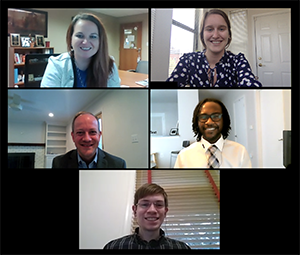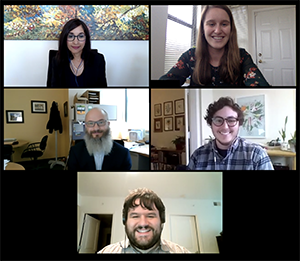NASFAA Hosts First Virtual Advocacy Pipeline With Graduate and Professional Aid Administrators
By Rachel Gentry, NASFAA Policy & Federal Relations Staff
During the last week of October, NASFAA held its first-ever virtual Advocacy Pipeline, during which five members representing graduate and professional (G/P) schools met with congressional staffers. While in-person meetings on Capitol Hill came to halt in March, the virtual pipeline allowed the financial aid community to continue participating in direct advocacy despite the ongoing pandemic.
Five NASFAA members participated in the visits, including Jayme Jarret of Ohio Northern University, Christopher Pollard of the George Washington University Law School, John Stiles of the University of the Cincinnati College of Medicine, Nasreen Zia of the University of California, Irvine School of Law, and Nick Anderson of Mitchell Hamline School of Law.
Participants met with the staff of 11 members of Congress representing their home states and districts, including Sens. Sherrod Brown (D-Ohio), Rob Portman (R-Ohio), Kamala Harris (D-Calif.), Tina Smith (D-Minn.), and Amy Klobuchar (D-Md.), and Reps. Robert Latta (R-Ohio), Steve Chabot (R-Ohio), Eleanor Holmes Norton (D-D.C.), Marcia Fudge (D-Ohio), Betty McCollum (D-Minn.), and Katie Porter (D-Calif.).
This is the fifth year that NASFAA has hosted the "G/P Hill Day" advocacy event, focused specifically on student aid issues impacting graduate and professional students. This year, the group discussed legislative priorities such as eliminating student loan origination fees, restoring subsidized loan eligibility, preserving Public Service Loan Forgiveness, and simplifying loan repayment. Participants also expressed their gratitude for the emergency funds received through the Coronavirus Aid, Relief, and Economic Security (CARES) Act, discussed the challenges facing their students amid the pandemic, and emphasized the need for additional COVID-19 relief funds.
We asked the advocacy pipeline participants to share their thoughts and takeaways. Read on to learn about their experiences, and fill out an interest form if you would like to participate in a virtual advocacy pipeline.
 Christopher Pollard, Assistant Director of Financial Aid, The George Washington University Law School
Christopher Pollard, Assistant Director of Financial Aid, The George Washington University Law School
Advocating on behalf of federal student aid recipients across the country is always an honor and privilege I do not take lightly. A huge part of the reason I moved to Washington, D.C. five years ago was the idea of being in close proximity to where policy decisions are made — policy decisions that not only affect the work we do but, more importantly, the students we serve. My favorite part of the advocacy pipeline is learning how congressional offices prioritize Higher Education Act-related issues, and where they stand on federal student aid policy matters. This was my fourth time "on" the Hill to speak on behalf of student aid recipients, and this was the most substantive visit to date. In our meetings, we discussed issues relevant to graduate and professional populations of student aid recipients, such as: the elimination of loan origination fees, the preservation of the Public Service Loan Forgiveness Program, simplifying loan repayment (without sacrificing the good parts of the existing options), and we expressed our appreciation for the passing of the CARES Act earlier this year. For those in our profession interested in doing future Advocacy Pipeline events, I strongly encourage them to get involved and active in the advocacy efforts on all levels (local, state, and federal).
This work is very rewarding because it gives our profession credibility when it comes to the policy needs of our students. When I counsel students who are unhappy about loan origination fees, in good conscience, I can tell them that financial aid professionals across the country advocate tirelessly for the elimination of loan origination fees to our elected officials. We're already seeing the benefits of our advocacy, as one of the offices we met with notified us after the meeting that they planned to ask to be added as a co-sponsor of the Eliminating the Hidden Student Loan Tax Act, a bill that would eliminate student loan origination fees. This happened because of financial aid professionals' commitment to our students and advocacy for their best interests. I'm looking forward to continued participation in the Advocacy Pipelines and the strides these efforts will make in the future.
John Stiles, Director of Student Financial Services, University of Cincinnati College of Medicine
As someone who started in financial aid 20 years ago, I had never before participated in NASFAA's advocacy pipeline until this fall. While I was very excited to participate in these visits centered on advocacy for graduate and professional students, I did allow doubt to creep into my mind that my voice was not "enough" to be heard by those who work on Capitol Hill. Right away during our first meeting with a congressional staffer, though, those doubts drifted away, as I understood it is our day-in and day-out experiences working with our students that is the foundation for our advocacy. Those experiences of what's working well and what pain points our students and our offices face were more than enough to be able to advocate for change.
Throughout the day, we conducted six video call meetings with congressional staffers, four of which were from my home state of Ohio. I believe they all went well, as the staffers listened intently, often asked good questions, and our scheduled time usually ran out. I was encouraged to see some of them were aware and already advocating on many of the same issues we came ready to discuss, such as the elimination of loan origination fees, the simplification of repayment plan options (while maintaining benefits borrowers deserve), solidifying Public Service Loan Forgiveness, and restoring subsidized loans for graduate students.
While it evidently took me 20 years to engage in this work, I want to encourage my fellow NASFAA members to not wait as long as I did and to jump into this wonderful experience. The knowledge you have already and your passion for your students is more than enough to advocate for change. You can help shape the future of our profession and of the higher education landscape that future students will experience in the years to come!
 Nasreen Zia, Director of Student Financial Services, University of California - Irvine School of Law
Nasreen Zia, Director of Student Financial Services, University of California - Irvine School of Law
I had the privilege to participate in NASFAA's virtual Advocacy Pipeline and meet with our delegation in the U.S. Congress. Before signing up for the virtual meetings, I was nervous and I thought that virtual advocacy was intimidating. When we started our first virtual meeting with the staff of Sen. Amy Klobuchar (D-Minn.), I felt grateful to have the opportunity and was eager to discuss financial aid policy issues impacting our work and students. During our meetings, I expressed my concern regarding loan origination fees and any proposals that would limit the Public Service Loan Forgiveness (PSLF) program. Prior to PSLF, there was a lack of incentives for lawyers to work in the public sector. Law school graduates were drawn to high-paying private sector work, and local communities struggled to fill other positions.
It was affirming to see that the staffers were interested in our message. They were very cordial and had many questions about our profession. The meetings moved and inspired me to continue with advocacy, and I highly encourage others to speak for the profession that we are so passionate about and to help bring important issues to the attention of Congress.
Jayme Jarrett, Assistant Director of Financial Aid, Ohio Northern University
Advocacy via Zoom was never on my radar. I was all lined up to come to D.C. in March for NASFAA's Advocacy Pipeline, but I think we all know what started happening to events and trips in March. Clearly, this experience was not what I expected at all, but 2020 has taught us to do old things in new ways.
First, NASFAA does an amazing job of preparing us for the day. Rachel Gentry, assistant director of federal relations, makes all of the meeting arrangements and lets us know in advance who we'll be meeting with, and we have an advance meeting to discuss the issues we want to talk about and get an outline for the meetings. I loved meeting with aides from both Senate offices in my state, as well as my congressional representative's office. In a previous Hill visit, I had met with their offices, but with different assistants, so it was nice to connect with new people, and also with people in different congressional representatives' offices from my state. I did a little homework on those representatives in case something came up in conversation — something I would always recommend to anyone doing a Hill visit.
As I mentioned earlier, I have done a Hill visit before, so I had an idea of what to expect, but virtual was a new world, for both NASFAA and for me. Honestly, the meetings went extremely well, probably due to us being extremely prepared. We had 30-minute time slots allotted, and my colleagues and I filled every single one of those minutes (and more) with talk of issues we'd like to see addressed, anecdotes of students from our campuses, and policies that will benefit students across the nation. One of the most exciting things that came from the day is that we already received an email back that a representative has asked to be a co-sponsor on the Eliminating the Hidden Student Loan Tax Act, a bill in the House to eliminate student loan origination fees, due to our conversations that day. This means that advocacy is so important, and anyone can do it — if I can, you can! I'm more than happy to talk to anyone individually about the experience, and I would recommend you advocate at the state and/or national level.
Nick Anderson, Financial Aid Director, Mitchell Hamline School of Law
Getting a chance to sit down and talk to some of the staff for our members of Congress was a great experience. It was wonderful to see how informed and engaged they were with policies that affect all of our students. They asked questions in a way that made it clear we knew that what we were saying was important and valued.
In all honesty, I was surprised by how versed some of the staff was with the policies we were advocating for. It makes me, as a citizen, happy to know that there are people in government that both understand our issues and are willing to learn more. It also helped me to feel more engaged in the overall discussions related to federal financial aid policies. I would recommend anyone who is interested in the Advocacy Pipeline to volunteer. It was a wonderful experience.
For more pictures from the event, check out NASFAA's Advocacy Pipeline Facebook album. If you're interested in volunteering to be a part of NASFAA's Advocacy Pipeline, fill out an interest form here.
Publication Date: 11/17/2020






You must be logged in to comment on this page.